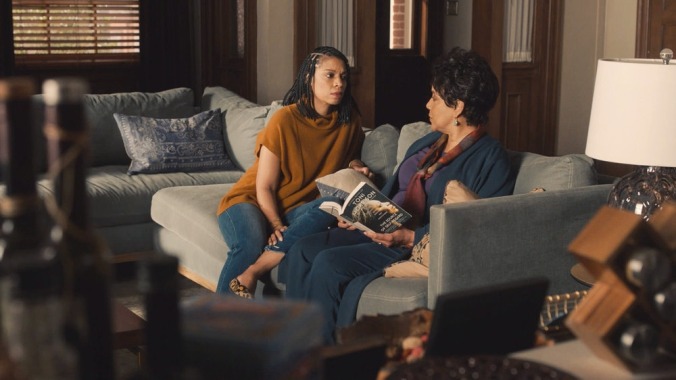This Is Us’ latest queer storyline dances between honest and old-fashioned


The most compelling throughline in “Both Things Can Be True” takes up the least amount of screentime. In what feels like nothing I’ve seen on network TV before, Randall attends a group therapy session for transracial adoptees in which a diverse group of people speak openly and honestly about the uncomfortable truths of their lives. The way that multiple things can be true at once. That even though many of them love their adoptive families, they also carry a resentment at having grown up othered in their own homes and communities. It’s hard to let go of their “Ghost Kingdoms”—the dreams of how their lives might have been if they’d grown up with their biological parents. One woman shares that she wishes she had never been adopted at all.
A lot of what they say clearly rings true to Randall, although how much and in what way is yet to be seen. Because, in an unusual move for him, Randall decides to process things by listening rather than talking for once. Randall the great “orator” has long mastered the art of selling his adoption story as something that gives him a special outlook on life. But at group therapy, he experiences the shock of realizing that other people share the feelings and fears he thought were his alone. The ones he bottled deep down for most of his life lest he seem ungrateful, lest he prove to be a disappointment, lest an element of his carefully managed life spin out of his control.
Randall’s choice to remain silent, coupled with Sterling K. Brown’s stellar internal acting, sells just how impactful that group therapy session is for Randall. And that’s definitely the storyline I’m most looking forward to This Is Us continuing to explore. I’ve been worried that the decision to embrace our pandemic reality and weave in the story of Randall’s birth mom meant the show was dropping Randall’s wildly compelling self-reflective arc from the end of season four. But, as is so often the case, it turns out This Is Us is more committed to its long-term character arcs than I give it credit for.
Which is why I’m inclined to take a little bit of a “wait and see” approach to the portion of this episode that I’m still parsing: Beth and Tess’ complex conflict over Tess’ burgeoning teen relationship with her non-binary significant other, Alex. To their credit, the writers make some strong choices in this storyline, like using Carol’s ease with pronouns and non-binary identities as a foil for Beth’s struggle to adjust. Or softening Beth and Carol’s relationship ahead of adding tension to the Beth/Tess one, which at least sort of evens the scales of how often This Is Us defaults to depicting conflict-filled mother/daughter relationships.
Yet there are other elements of the Beth/Tess storyline that sit rather strangely. For one thing, Beth’s struggle to accept her daughter’s sexuality feels pretty out of character for the otherwise progressive, plugged-in person that she is—especially since it’s been more than two years since Tess first came out. And while that internal conflict could be great fodder for an unexpected Beth storyline, right now there aren’t enough layers at play for it to fully work as such. Instead of framing the issue as one in which Beth is shocked and embarrassed that she has more internalized biases around queerness than she realized, we instead get a more retro framing in which Beth is first and foremost still struggling to wrap her head around the idea that her daughter won’t be marrying a man. It’s a subtle difference, but it’s part of the reason Beth’s arc feels more like something you’d see in a late ’90s or early 2000s series, rather than one a contemporary one.
While the Randall group therapy scenes soar because they’re filled with specificity, the Beth/Tess/Alex throughline is more muddled. The show combines Beth’s struggle to accept Tess’ sexuality with her general confusion over non-binary identities in a way that feels like it does a disservice to both issues, and makes it harder to understand exactly where Beth is coming from. Plus it feels really bizarre that Randall is so detached from the whole thing, both because he knows firsthand what it’s like to struggle with feeling like an outsider in your own family, and because he and Beth usually handle their big parenting moves together. Does he have similar issues with Tess’ identity and her significant other? If not, why isn’t he helping Beth process her own?
Perhaps those are the questions we’re supposed to be asking, however. “Both Things Can Be True” elevates the somewhat messy Beth/Tess throughline by giving Tess her own moment that encapsulates the episode’s title: Tess explains that while she appreciates that her mom is trying, it’s also pretty shitty to watch your parent have to actively try to accept you and your identity in a way they don’t with your siblings. There’s a brutal but earned honesty to that statement, and I like that the episode leaves the tension unresolved rather than rushing to put a neatly sentimental bow on things.
The rest of “Both Things Can Be True” delivers some serviceable present-day storylines and a disappointingly weak flashback one. Back in the 1970s, Miguel helps Jack prepare for his big proposal to Rebecca and ultimately becomes his best friend’s knight-in-shining-armor when Rebecca’s dad (hi Tim Matheson!) shows up with the most half-assed of apologies. While it’s always nice to see Miguel get a big hero moment, the whole flashback storyline feels pretty underbaked. Lampshading the fact that Miguel and Jack’s engagement ring antics are straight out of an I Love Lucy episode doesn’t make that subplot feel any less blandly sitcom-y. And Rebecca’s absence from her own proposal storyline feels more like a result of Mandy Moore’s maternity leave than a purposeful storytelling choice, in which case why even include that storyline at all?
The present-day Miguel stuff is more compelling. You wouldn’t expect Nicky, of all people, to be territorial over Miguel marrying Rebecca, but his ornery personality works well to shake up the sunny supporting role that Miguel has fallen into lately. While This Is Us has done a great job selling Miguel and Rebecca as one of the show’s sweetest couples, there’s still that inherent level of weirdness to their pairing. (Again, both things can be true.) And it makes sense that Nicky, with his strange insider/outsider status with the Pearsons, would pick up on it.
Ultimately, however, Nicky’s concerns about Miguel and Rebecca’s marriage stem from a deeper place: The fear that Jack replaced him with Miguel after their falling out. In another nice hero moment, the ever gracious Miguel helps Nicky understand that even though Jack cut his little brother out of his life after the Vietnam War, he never entirely forgot him either. Miguel suggests that part of the reason Jack asked him to be his best man in action but not in name is because deep down he was saving that title for Nicky. Like the “So Long, Marianne” scene from last season’s midseason finale, it’s another lovely step towards healing the Nicky/Jack divide and bringing Nicky more firmly into the Pearson family fold.
While there’s some nice stuff in “Both Things Can Be True”—especially that therapy scene—the episode’s most exciting moments are what it hints at for the future. This hour does some heavy-lifting plot-wise as we move towards what will hopefully be a thematically meaty final six episodes of the season. With a pandemic wedding on the horizon and a brotherly reckoning even closer in sight, there will certainly be no shortage of places for This Is Us to bring its characters barreling towards more complicated grey areas.
Stray observations
- Just when you thought it was safe to get out of the love triangle water: This episode ends with Zoe, Cassidy, and Sophie all reacting to the news that Kevin is engaged to Madison. Let the dating Hunger Games begin!
- We also get confirmation that Kevin is famous enough for his engagement to make the cover of Us Weekly, but not famous enough to usurp the lead story from Meghan Markle. Fair enough.
- After pulling the absolutely wild move of arriving to teach a class one minute before it begins (???), Kate eventually excels as a music teacher. Toby, meanwhile, is struggling with being a stay-at-home parent. He doesn’t tell Kate about his concerns, however, which seems like a red flag. As does Kate’s new uptight British co-worker, Phillip (You’re The Worst’s Chris Geere).
- We also learn a little bit more about Madison’s emotionally withholding dad and how her parents’ divorce shaped her present-day struggles to ask for what she wants.
- I hope we get to see more of Alex moving forward. Even with barely any screentime, actor Presley Alexander makes a really warm impression.
- I’m very confused about how time is passing this season. How long ago were the New Big Three born? Days? Weeks? Months?